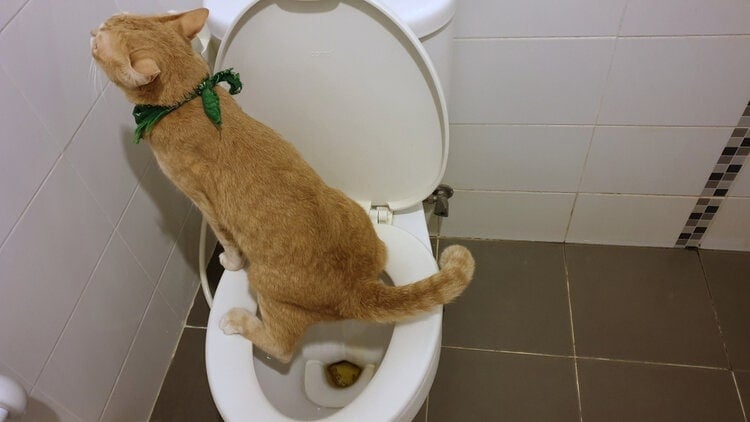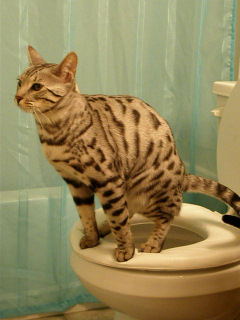Reasons Flushing Cat Poop Down Your Toilet Is Harmful - Tips for Correct Disposal
Reasons Flushing Cat Poop Down Your Toilet Is Harmful - Tips for Correct Disposal
Blog Article
What are your thoughts about Don’t flush cat feces down the toilet?

Intro
As feline owners, it's essential to be mindful of how we dispose of our feline close friends' waste. While it may seem convenient to flush pet cat poop down the bathroom, this practice can have damaging consequences for both the setting and human wellness.
Alternatives to Flushing
Thankfully, there are safer and more accountable methods to get rid of feline poop. Think about the following alternatives:
1. Scoop and Dispose in Trash
One of the most usual method of dealing with cat poop is to scoop it right into an eco-friendly bag and toss it in the trash. Be sure to make use of a committed trash scoop and deal with the waste promptly.
2. Usage Biodegradable Litter
Go with biodegradable cat clutter made from products such as corn or wheat. These trashes are environmentally friendly and can be securely thrown away in the trash.
3. Bury in the Yard
If you have a backyard, think about burying cat waste in a marked location away from veggie gardens and water sources. Make certain to dig deep sufficient to prevent contamination of groundwater.
4. Set Up a Pet Waste Disposal System
Invest in a pet dog garbage disposal system especially created for feline waste. These systems make use of enzymes to break down the waste, minimizing odor and ecological effect.
Health Risks
Along with environmental worries, flushing feline waste can additionally pose health and wellness threats to human beings. Cat feces may include Toxoplasma gondii, a bloodsucker that can create toxoplasmosis-- a potentially severe disease, specifically for pregnant ladies and people with damaged immune systems.
Environmental Impact
Flushing pet cat poop introduces damaging virus and parasites into the supply of water, posing a considerable danger to water ecological communities. These impurities can adversely influence aquatic life and concession water high quality.
Verdict
Accountable pet ownership expands beyond supplying food and shelter-- it also involves proper waste monitoring. By avoiding purging cat poop down the bathroom and selecting alternative disposal methods, we can lessen our ecological impact and secure human health.
Why You Should Never Flush Cat Poop Down the Toilet
A rose by any other name might smell as sweet, but not all poop is created equal. Toilets, and our sewage systems, are designed for human excrement, not animal waste. It might seem like it couldn’t hurt to toss cat feces into the loo, but it’s not a good idea to flush cat poop in the toilet.
First and foremost, assuming your cat uses a litter box, any waste is going to have litter on it. And even the smallest amount of litter can wreak havoc on plumbing.
Over time, small amounts build up, filling up your septic system. Most litter sold today is clumping; it is made from a type of clay that hardens when it gets wet. Ever tried to scrape old clumps from the bottom of a litter box? You know just how cement-hard it can get!
Now imagine just a small clump of that stuck in your pipes. A simple de-clogger like Drano isn’t going to cut it. And that means it’s going to cost you big time to fix it.
Parasitic Contamination
Believe it or not, your healthy kitty may be harboring a nasty parasite. Only cats excrete Toxoplasma in their feces. Yet it rarely causes serious health issues in the cats that are infected. Most people will be fine too if infected. Only pregnant women and people with compromised immune systems are at risk. (If you’ve ever heard how women who are expecting are excused from litter cleaning duty, Toxoplasma is why.)
But other animals may have a problem if infected with the parasite. And human water treatment systems aren’t designed to handle it. As a result, the systems don’t remove the parasite before discharging wastewater into local waterways. Fish, shellfish, and other marine life — otters in particular — are susceptible to toxoplasma. If exposed, most will end up with brain damage and many will die.
Depending on the species of fish, they may end up on someone’s fish hook and, ultimately on someone’s dinner plate. If that someone has a chronic illness, they’re at risk.
Skip the Toilet Training
We know there are folks out there who like to toilet train their cats. And we give them props, it takes a lot of work. But thanks to the toxoplasma, it’s not a good idea.

As a fervent person who reads about How to Dispose of Cat Poop and Litter Without Plastic Bags, I imagined sharing that excerpt was a good thing. Are you aware of anybody else who is excited about the topic? Feel free to promote it. Thanks a lot for your time invested reading it.
Course Detail Report this page